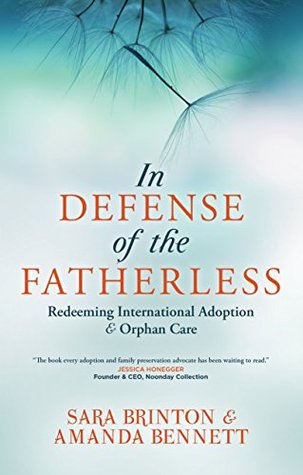Kindle Notes & Highlights
by
Sara Brinton
Read between
August 25 - October 1, 2019
Orphans who have families do not need adoption.
Defending the fatherless means not simply advocating for the rights of children who need new families to be adopted, it is also about defending the rights of vulnerable families.
Without understanding the connection between poverty, injustice and the orphan crisis, many Christians are responding with actions that have unintended consequences. Christians are responding to the global orphan crisis primarily by supporting orphanages, going on mission trips to visit orphans, and encouraging adoption. While all of these approaches may be necessary and at times helpful, they do nothing to address the poverty and injustice at the heart of the crisis. We are treating the symptoms rather than the cause of the orphan crisis.
The danger is that institutions lose focus on what is in the best interest of children and are driven by what is best for the institution.
We may be blinded by our own materialism: we would rather see smiling children living in a brightly painted orphanage than children living with a foster family in humble surroundings in Africa, Asia or Latin America. We elevate children’s obvious physical needs over their deeper emotional and spiritual needs. We believe that it is better to feed, clothe and educate a child than to leave a child with a poor family. We are uncomfortable seeing children growing up in poverty, and so we build orphanages that provide a higher standard of living.
Ethical international adoption systems function to find families for children, not the other way around.
Without sufficient regulation, the process fails to protect vulnerable families from coercion and corruption in the adoption process. These systems find children for families, rather than families for children.
When a country's abandoned and institutionalized children are predominantly older, HIV-positive, or otherwise sick or disabled, and yet the international adoptions are predominantly of infants and toddlers, it can be a signal that entrepreneurs are illegally or unethically attempting to find the children that Westerners want to adopt.5
In countries with private adoption systems, it is virtually impossible to determine how a child came into care and whether the process was free of coercion, deception or payments to induce relinquishment.
UNICEF estimates that 88 per cent of the world’s orphans are over the age of five.
Between 1996 and 2006, however, 89 per cent of the children adopted by American families were under the age of five.
As Americans, we have no right to go into countries in the developing world to tell people how to care for orphans and vulnerable children.
Our orphan care projects will fail if they do not have local ownership.
The most significant difference we can make in the life of a child living in an institution is to find him a safe, loving, permanent family.


